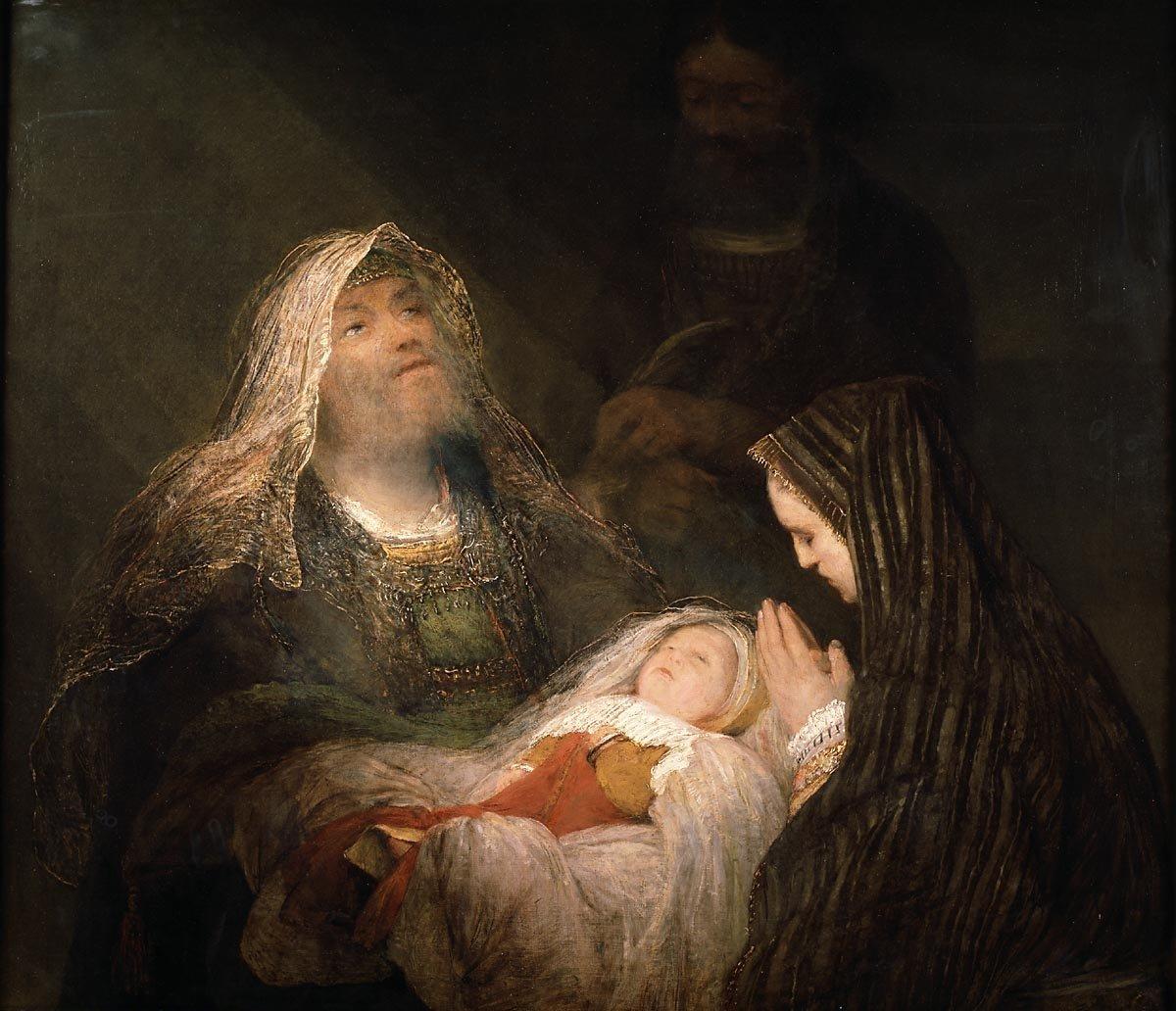Art and the Church -> Materials for Use in Churches

Sunday after Christmas - Arent de Gelder Simeon
Arent de Gelder: Simeon’s Song of Praise

A Holy Gathering
by Marleen Hengelaar-Rookmaaker
This painting about old Simeon is one of the best works by Dordrecht artist Arent de Gelder (1645-1727). De Gelder is known for being Rembrandt’s last pupil, which is obvious from his impasto style with paint laid on thickly, full of splodges and scratches. Just like his master he made frequent use of clair-obscur, the meaningful play of light and dark.
De Gelder’s Rembrandtesque way of working was definitely old-fashioned in a time that had grown enamoured with classical clarity and light colours. He was, however, a prosperous man and could therefore ignore the current trends. Just like Rembrandt he was a Calvinist. Even more than his master he limited himself almost exclusively to biblical topics. His works are full of devotion, simultaneously restrained and expressive.
In this painting we see Simeon, Mary and Joseph, and the forty-days-old Jesus. The new parents have come to the temple in Jerusalem to dedicate their first-born child to God. Moved by the Spirit Simeon is already there, waiting for them. He takes the child in his arms and praises God with the song that has become known as the Nunc dimittis or the Song of Simeon:
Lord, now let your servant depart in peace,
according to your word.
For my eyes have seen your salvation
which you have prepared before the face of all people
To be a light to lighten the Gentiles,
and the glory of your people Israel.
(Book of Common Prayer)
We see four people gathered in an intimate moment of praise and prayer. But God the Father is also present, represented by the wide beam of light descending from the upper left on the little group. Simeon looks up as he thanks God for the precious child in his arms. His eyes are turning away, towards the Father. The baby’s eyes too are turning upwards. Mary and Joseph keep their eyes closed, as they are inwardly directed towards God.
Joseph’s hands are crossed, pointing to the reversal that so often characterises God’s actions. ‘The first will be the last.’ Here this most likely refers to the Gentiles being mentioned first in the song and only later Israel.
It is a holy gathering, full of reverence and worship. The child, this beautifully painted child, forms the strongest source of light in the canvas. He after all is the light ‘to lighten the Gentiles and the glory of his people Israel.’
*******
Arent de Gelder: The Song of Simeon, 1700, oil on canvas, 94,5 x 107,5 cm. Mauritshuis, The Hague.
Arent (Aert) de Gelder (1645-1727) received his initial training as an artist from Samuel van Hoogstraten. Next, he moved to Amsterdam where he was educated in the studio of Rembrandt from 1661 to 1663. After his apprenticeship De Gelder returned to Dordrecht. He had an expressive style, which he applied consistently, even after this manner of working was no longer fashionable. He painted biblical scenes and a number of portraits. The influence of Rembrandt is visible in his free brush technique and the use of clair-obscur. De Gelder, however, preferred clearer colours. A 22-part Passion series (1715), now divided between the Amsterdam Rijksmuseum and Schloss Johannisburg in Aschaffenburg in Germany, is likely his most important work.
Marleen Hengelaar-Rookmaaker is chief editor of ArtWay.
ArtWay Visual Meditation December 31, 2023


